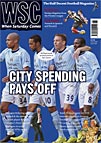 South Africa will relish the validation offered by the World Cup, even if its legacy will be mixed. Günther Simmermacher reports
South Africa will relish the validation offered by the World Cup, even if its legacy will be mixed. Günther Simmermacher reports
A commercial currently shown on South African TV shows an ex-pat in London having a Skype video chat with his friend back at home. The scarf-clad ex-South African eulogises how “everything is better” in London – until his friend takes a bite of the burger that the ad is peddling. The obvious message is that the condescending ex-pats are wrong: not everything is better in London.
Alternate the burger for the 2010 World Cup for a hint of what the event means to South Africans – a chance to show their country qualifies as world-class: to the émigrés in Perth, Auckland, Toronto and Dublin; and to a world that associates the country with racial conflict, violent crime, ex-president Thabo Mbeki’s bizarre Aids denialism and the election of a corruption-accused president. Most importantly, perhaps, it is a time for South Africans, always swinging between hubris and hair-shirtedness, to validate themselves through international affirmation.
This need for world approval can be explained by a lingering effect of South Africa’s international isolation during the apartheid era and by its geographical seclusion from those with which the country seeks to measure itself. So it was not unexpected when the hastily (and very adeptly) rearranged Indian Premier League cricket tournament that started in April turned out to be a huge popular success. By hosting a successful World Cup, South Africans feel they – and to a lesser extent Africa – will take their full place in the international community.
Contrary to FIFA’s concerns, the progress of South Africa’s team, Bafana Bafana, will be largely irrelevant to the event’s success. The country’s football fans, never particularly passionate about Bafana, have few expectations of the team, which failed to qualify for next year’s African Cup of Nations. Some passion will be roused should Bafana defy form and escape from the group stages. But if they don’t, then South Africans already will have adopted a glamorous team from Europe or South America (perhaps even preferring them to Bafana). Stadiums will have a local presence on the strength of ticket allocations reserved for South African residents, with prices for group games starting at ZAR130 (less than £10). Rarely has the performance of a host nation been so immaterial to the success of a tournament.
Some South Africans see 2010 as a means of cashing in. Restaurant prices will doubtless increase unreasonably in host cities. Many people are planning to rent out their homes at exorbitant rates. Informal traders are making extravagant plans that will almost certainly be crushed by the “official sponsor” police, who during the 2003 cricket world cup ejected fans for drinking the wrong brand of cola.
The concrete benefits, and perils, of the World Cup are long-term. Host cities are developing their infrastructure at a break-neck pace, with long-overdue transport and airport upgrades, road system improvements and urban rejuvenation projects (such as a big commons around Cape Town’s spectacularly located stadium).
At the same time, however, many host cities will be stuck with municipally-owned stadiums for which there will be little sustainable post-2010 use, echoing the experience of South Korea eight years earlier. Port Elizabeth has one newly promoted and swiftly relegation-bound football team in the Premier League (the first in many years) and a provincial rugby side widely regarded as the worst in the country. It is difficult to see under what circumstances the city’s 50,000-seater Nelson Mandela Bay Stadium will ever be filled again after 2010. Likewise, Nelspruit (44,000 seats) and Polokwane (46,000) are sporting backwaters. The city of Cape Town banks on the Western Province and Stormers rugby sides abandoning their traditional home in Newlands for the bigger, flashier Green Point Stadium. Local Premier League sides Ajax and Santos attract only a few thousand spectators to home games; it will make better sense to play these at the smaller Athlone Stadium. All the while, ratepayers will have to cover the costs for maintaining white elephants.
The test run for 2010 kicks off in June: the unloved Confederations Cup. South Africans may be starved of international attention, but they can spot a scam as well as anyone. Ticket sales are so sluggish that they are now being sold for as low as R70 (about £5). Sepp Blatter, still a hostage to the illusion that anyone cares much about the Confed Cup, will be alarmed by that lack of excitement and what it might augur for 2010. He need not be: once the inevitably mortifying opening ceremony on June 11, 2010 is out of the way, South Africa will host a well organised World Cup – so good, perhaps, as to convince London-based ex-pats that not everything is better in their adopted home.
From WSC 268 June 2009